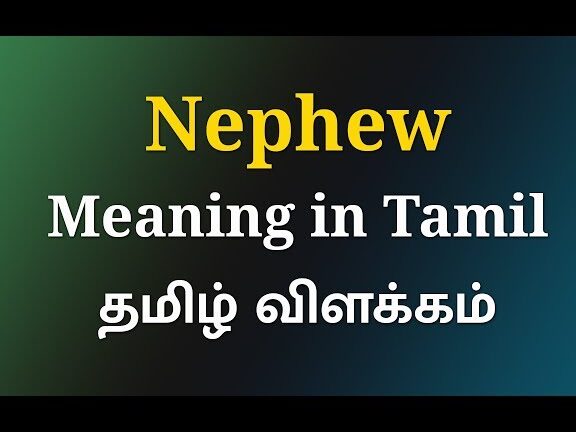
The Significance and Deep Meaning of Nephew in Tamil Culture

Welcome to meaningofthings.in! In this article, we delve into the meaning of "nephew" in Tamil. Discover the cultural significance and emotional depth behind this relationship term. Explore how the Tamil language beautifully captures the bond between an uncle or aunt and their beloved nephew. Let's unravel the nuances together!
Understanding the Meaning of Nephew in Tamil: Unraveling Family Bonds
Understanding the Meaning of Nephew in Tamil: Unraveling Family Bonds
Maybe you may be interestedUnraveling the Meaning of 'Sorry for Inconvenience' in Bengali: A Deeper UnderstandingExploring the meaning of nephew in Tamil is a fascinating journey into the intricacies of family relationships. In Tamil, the word for nephew is "mamaar", which is derived from the root word "maama" meaning maternal uncle. This highlights the strong emphasis placed on maternal kinship in Tamil culture.
In Tamil society, the bond between an uncle and his nephew is considered sacred and significant. It is a relationship built on trust, guidance, and support. The uncle plays a crucial role in the upbringing and development of his nephew, similar to a father figure. The nephew, on the other hand, looks up to his uncle as a mentor and seeks his advice and wisdom.
Maybe you may be interestedUnderstanding the Not Mandatory Meaning in Tamil: Exploring Cultural NormsNephews hold a cherished place within extended Tamil families. They are often seen as the future torchbearers of their clan, responsible for carrying forward traditions, customs, and values. This sense of responsibility gives nephews a unique status and role within their family dynamic.
The meaning of nephew in Tamil extends beyond biological relationships. In Tamil culture, it is common for close friends to be referred to as nephews as a sign of endearment and camaraderie. This reflects the importance of chosen family and the bonds formed through shared experiences and mutual respect.
Maybe you may be interestedUnderstanding the Should Marathi Meaning: A Comprehensive GuideIn conclusion, exploring the meaning of nephew in Tamil reveals the deep-rooted significance of family bonds and the pivotal role nephews play within Tamil society. Whether through blood ties or chosen connections, nephews are held in high regard and their relationships with their uncles are revered. Understanding this cultural context provides valuable insights into the intricate tapestry of human connections and the diverse meanings attached to family dynamics in different cultures.
Frequent questions
What is the meaning of nephew in Tamil?
In Tamil, the word for nephew is "அண்ணன் மணந்தை" (pronounced as "Annaan manndhai"). Annan refers to an elder brother and manndhai means daughter. Therefore, when combined, it means a nephew, specifically the son of one's brother.
Maybe you may be interestedThe Beauty of Language: Exploring the Meaning of 'Looking So Beautiful' in Marathi How is the term "nephew" translated into Tamil?
The term "nephew" is translated as மருமகன் (marumakan) in Tamil. Marumakan is a combination of two Tamil words, "maru" which means 'other' or 'relative', and "makan" which means 'son'. Hence, it literally refers to the 'son of another' or the son of one's sibling.
Can you explain the cultural significance of the term "nephew" in Tamil language?
In Tamil culture, the term "nephew" holds significant cultural and familial importance. In Tamil language, the word "nephew" is commonly referred to as "marumagan" or "achan marumagan". The term is used to denote the son of one's sibling or relative.
Maybe you may be interestedUncovering the Intriguing Meaning of 'Hey There' in Marathi: A Linguistic DiveThe cultural significance of the term "nephew" in Tamil language can be understood in various aspects. Firstly, it represents the strong bond and relationship between the extended family members. In Tamil culture, family ties are highly valued and nurtured, with a great emphasis on maintaining close connections with relatives. The term "nephew" acknowledges and reinforces this sense of kinship and belonging.
Furthermore, the term "nephew" also carries certain responsibilities and expectations within the Tamil community. As an elder member of the family, one is expected to provide guidance, support, and mentorship to their nephews. This role often involves imparting knowledge, sharing life experiences, and serving as a positive role model for the younger generation. The relationship between an uncle or aunt and their nephew is seen as an important avenue for personal growth and development.
Maybe you may be interestedThe Meaning of 'We Are Not Meant to be Together' in Hindi: Exploring the Depths of Relationship CompatibilityAdditionally, the term "nephew" holds relevance in the inheritance and succession processes within Tamil families. In certain traditional Tamil customs, the nephew may have specific rights or entitlements to property or assets. This reflects the importance of lineage and the passing down of ancestral wealth within the family.
Overall, the term "nephew" in Tamil language encapsulates the values of family, responsibility, mentorship, and cultural traditions. It symbolizes the interconnectedness of relatives and the roles they play in each other's lives. Understanding the cultural significance of this term helps to appreciate and respect the depth of familial relationships in Tamil culture.
Maybe you may be interestedThe Significance of Spam Reports: Unraveling the Meaning in TamilIn conclusion, understanding the meaning of nephew in Tamil provides us with valuable insights into the cultural significance given to family relationships in this language. The term "nephew" holds a dual meaning, referring not only to the son of one's sibling but also to the son of one's brother-in-law or sister-in-law. This nuanced definition reflects the deep-rooted importance of extended family bonds and kinship ties that are cherished in Tamil culture. By delving into such meanings of things, we gain a broader understanding of different languages and cultures, allowing us to appreciate the richness and diversity of our world.
Si quieres conocer otros artículos parecidos a The Significance and Deep Meaning of Nephew in Tamil Culture puedes visitar la categoría SOCIETY.




